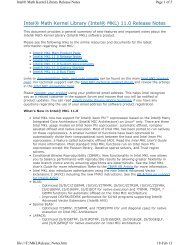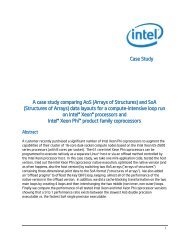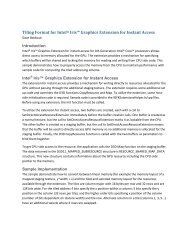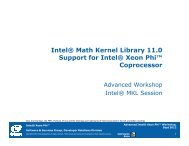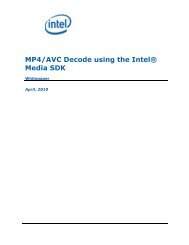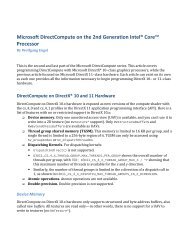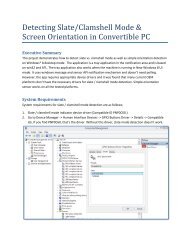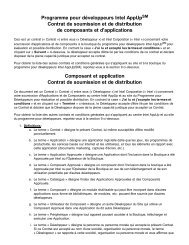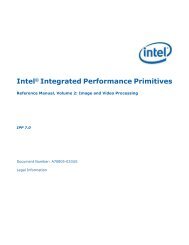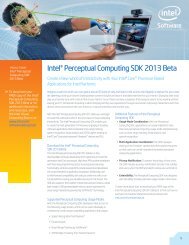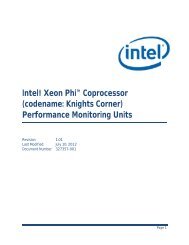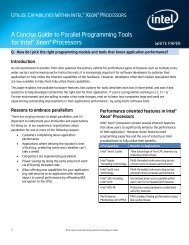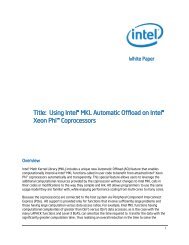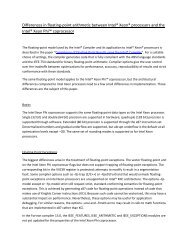- Page 1 and 2:
Intel® Architecture Instruction Se
- Page 3 and 4:
CONTENTS CHAPTER 1 INTEL® ADVANCED
- Page 5 and 6:
PANDN — Logical AND NOT . . . . .
- Page 7 and 8:
BZHI — Zero High Bits Starting wi
- Page 9 and 10:
TABLES 2-1 Rounding behavior of Zer
- Page 11 and 12:
FIGURES Figure 2-1. General Procedu
- Page 13 and 14:
INTEL® ADVANCED VECTOR EXTENSIONS
- Page 15 and 16:
INTEL® ADVANCED VECTOR EXTENSIONS
- Page 17 and 18:
INTEL® ADVANCED VECTOR EXTENSIONS
- Page 19 and 20:
APPLICATION PROGRAMMING MODEL Prior
- Page 21 and 22:
APPLICATION PROGRAMMING MODEL } and
- Page 23 and 24:
APPLICATION PROGRAMMING MODEL Scala
- Page 25 and 26:
APPLICATION PROGRAMMING MODEL x (mu
- Page 27 and 28:
APPLICATION PROGRAMMING MODEL Instr
- Page 29 and 30:
APPLICATION PROGRAMMING MODEL Table
- Page 31 and 32:
APPLICATION PROGRAMMING MODEL Excep
- Page 33 and 34:
APPLICATION PROGRAMMING MODEL 2.7.2
- Page 35 and 36:
APPLICATION PROGRAMMING MODEL 2.7.4
- Page 37 and 38:
APPLICATION PROGRAMMING MODEL 2.7.6
- Page 39 and 40:
APPLICATION PROGRAMMING MODEL 2.7.9
- Page 41 and 42:
APPLICATION PROGRAMMING MODEL 2.7.1
- Page 43 and 44:
APPLICATION PROGRAMMING MODEL 2.8.1
- Page 45 and 46:
APPLICATION PROGRAMMING MODEL Table
- Page 47 and 48:
APPLICATION PROGRAMMING MODEL Table
- Page 49 and 50:
APPLICATION PROGRAMMING MODEL Table
- Page 51 and 52:
APPLICATION PROGRAMMING MODEL Table
- Page 53 and 54:
APPLICATION PROGRAMMING MODEL EAX 3
- Page 55 and 56:
APPLICATION PROGRAMMING MODEL Table
- Page 57 and 58:
APPLICATION PROGRAMMING MODEL Table
- Page 59 and 60:
APPLICATION PROGRAMMING MODEL Table
- Page 61 and 62:
APPLICATION PROGRAMMING MODEL • T
- Page 63 and 64:
APPLICATION PROGRAMMING MODEL How B
- Page 65 and 66:
APPLICATION PROGRAMMING MODEL
- Page 67 and 68:
APPLICATION PROGRAMMING MODEL EAX[1
- Page 69 and 70:
APPLICATION PROGRAMMING MODEL EBX
- Page 71 and 72:
SYSTEM PROGRAMMING MODEL • Verify
- Page 73 and 74:
SYSTEM PROGRAMMING MODEL The proces
- Page 75 and 76:
SYSTEM PROGRAMMING MODEL 3.3 RESET
- Page 77 and 78:
INSTRUCTION FORMAT 4.1.1 VEX and th
- Page 79 and 80:
INSTRUCTION FORMAT (Bit Position) 7
- Page 81 and 82:
INSTRUCTION FORMAT The VEX.vvvv fie
- Page 83 and 84:
INSTRUCTION FORMAT 4.1.8 The Third
- Page 85 and 86:
INSTRUCTION FORMAT NOTES: 1. If Mod
- Page 87 and 88:
INSTRUCTION SET REFERENCE (V)ADDSD
- Page 89 and 90:
INSTRUCTION SET REFERENCE register
- Page 91 and 92:
INSTRUCTION SET REFERENCE MPSADBW
- Page 93 and 94:
INSTRUCTION SET REFERENCE SRC2_BYTE
- Page 95 and 96:
INSTRUCTION SET REFERENCE VMPSADBW
- Page 97 and 98:
INSTRUCTION SET REFERENCE DEST[79:6
- Page 99 and 100:
INSTRUCTION SET REFERENCE Operation
- Page 101 and 102:
INSTRUCTION SET REFERENCE PACKSSWB/
- Page 103 and 104:
INSTRUCTION SET REFERENCE DEST[79:6
- Page 105 and 106:
INSTRUCTION SET REFERENCE PACKUSDW
- Page 107 and 108:
INSTRUCTION SET REFERENCE TMP[239:2
- Page 109 and 110:
INSTRUCTION SET REFERENCE DEST[119:
- Page 111 and 112:
INSTRUCTION SET REFERENCE PADDB/PAD
- Page 113 and 114:
INSTRUCTION SET REFERENCE PADDQ (Le
- Page 115 and 116:
INSTRUCTION SET REFERENCE PADDSB/PA
- Page 117 and 118:
INSTRUCTION SET REFERENCE PADDUSB/P
- Page 119 and 120:
INSTRUCTION SET REFERENCE PALIGNR
- Page 121 and 122:
INSTRUCTION SET REFERENCE PAND —
- Page 123 and 124:
INSTRUCTION SET REFERENCE PANDN —
- Page 125 and 126:
INSTRUCTION SET REFERENCE PAVGB/PAV
- Page 127 and 128:
INSTRUCTION SET REFERENCE PBLENDVB
- Page 129 and 130:
INSTRUCTION SET REFERENCE IF (MASK[
- Page 131 and 132:
INSTRUCTION SET REFERENCE PBLENDW
- Page 133 and 134:
INSTRUCTION SET REFERENCE ELSE DEST
- Page 135 and 136:
INSTRUCTION SET REFERENCE Descripti
- Page 137 and 138:
INSTRUCTION SET REFERENCE PCMPEQQ (
- Page 139 and 140:
INSTRUCTION SET REFERENCE Descripti
- Page 141 and 142:
INSTRUCTION SET REFERENCE Intel C/C
- Page 143 and 144:
INSTRUCTION SET REFERENCE Operation
- Page 145 and 146:
INSTRUCTION SET REFERENCE PHADDSW
- Page 147 and 148:
INSTRUCTION SET REFERENCE PHSUBW/PH
- Page 149 and 150:
INSTRUCTION SET REFERENCE DEST[95:8
- Page 151 and 152:
INSTRUCTION SET REFERENCE Operation
- Page 153 and 154:
INSTRUCTION SET REFERENCE PMADDUBSW
- Page 155 and 156:
INSTRUCTION SET REFERENCE VPMADDWD
- Page 157 and 158:
INSTRUCTION SET REFERENCE VEX.128 e
- Page 159 and 160:
INSTRUCTION SET REFERENCE DEST[255:
- Page 161 and 162:
INSTRUCTION SET REFERENCE VEX.256 e
- Page 163 and 164:
INSTRUCTION SET REFERENCE DEST[255:
- Page 165 and 166:
INSTRUCTION SET REFERENCE VEX.256 e
- Page 167 and 168:
INSTRUCTION SET REFERENCE DEST[255:
- Page 169 and 170:
INSTRUCTION SET REFERENCE VEX.256 e
- Page 171 and 172:
INSTRUCTION SET REFERENCE VPMINUD (
- Page 173 and 174:
INSTRUCTION SET REFERENCE PMOVMSKB
- Page 175 and 176:
INSTRUCTION SET REFERENCE Opcode/ I
- Page 177 and 178:
INSTRUCTION SET REFERENCE VPMOVSXWQ
- Page 179 and 180:
INSTRUCTION SET REFERENCE PMOVZX
- Page 181 and 182:
INSTRUCTION SET REFERENCE Packed_Ze
- Page 183 and 184:
INSTRUCTION SET REFERENCE Other Exc
- Page 185 and 186:
INSTRUCTION SET REFERENCE Operation
- Page 187 and 188:
INSTRUCTION SET REFERENCE temp13[31
- Page 189 and 190:
INSTRUCTION SET REFERENCE PMULHUW
- Page 191 and 192:
INSTRUCTION SET REFERENCE Intel C/C
- Page 193 and 194:
INSTRUCTION SET REFERENCE DEST[15:0
- Page 195 and 196:
INSTRUCTION SET REFERENCE PMULLW/PM
- Page 197 and 198:
INSTRUCTION SET REFERENCE Temp10[31
- Page 199 and 200:
INSTRUCTION SET REFERENCE PMULUDQ
- Page 201 and 202:
INSTRUCTION SET REFERENCE POR — B
- Page 203 and 204:
INSTRUCTION SET REFERENCE PSADBW
- Page 205 and 206:
INSTRUCTION SET REFERENCE PSHUFB
- Page 207 and 208:
INSTRUCTION SET REFERENCE PSHUFD
- Page 209 and 210:
INSTRUCTION SET REFERENCE PSHUFHW
- Page 211 and 212:
INSTRUCTION SET REFERENCE PSHUFLW
- Page 213 and 214:
INSTRUCTION SET REFERENCE PSIGNB/PS
- Page 215 and 216:
INSTRUCTION SET REFERENCE DEST[255.
- Page 217 and 218:
INSTRUCTION SET REFERENCE PSLLDQ
- Page 219 and 220:
INSTRUCTION SET REFERENCE PSLLW/PSL
- Page 221 and 222:
INSTRUCTION SET REFERENCE Operation
- Page 223 and 224:
INSTRUCTION SET REFERENCE PSLLD (xm
- Page 225 and 226:
INSTRUCTION SET REFERENCE PSRAW/PSR
- Page 227 and 228:
INSTRUCTION SET REFERENCE COUNT 31
- Page 229 and 230:
INSTRUCTION SET REFERENCE PSRLDQ
- Page 231 and 232:
INSTRUCTION SET REFERENCE PSRLW/PSR
- Page 233 and 234:
INSTRUCTION SET REFERENCE FI; DEST[
- Page 235 and 236:
INSTRUCTION SET REFERENCE VPSRLQ (x
- Page 237 and 238:
INSTRUCTION SET REFERENCE Descripti
- Page 239 and 240:
INSTRUCTION SET REFERENCE DEST[175:
- Page 241 and 242:
INSTRUCTION SET REFERENCE PSUBSB/PS
- Page 243 and 244:
INSTRUCTION SET REFERENCE PSUBUSB/P
- Page 245 and 246:
INSTRUCTION SET REFERENCE PUNPCKHBW
- Page 247 and 248:
INSTRUCTION SET REFERENCE DEST[95:8
- Page 249 and 250:
INSTRUCTION SET REFERENCE VPUNPCKHW
- Page 251 and 252:
INSTRUCTION SET REFERENCE Instructi
- Page 253 and 254:
INSTRUCTION SET REFERENCE INTERLEAV
- Page 255 and 256:
INSTRUCTION SET REFERENCE VPUNPCKLD
- Page 257 and 258:
INSTRUCTION SET REFERENCE SIMD Floa
- Page 259 and 260:
INSTRUCTION SET REFERENCE Operation
- Page 261 and 262: INSTRUCTION SET REFERENCE VBROADCAS
- Page 263 and 264: INSTRUCTION SET REFERENCE Intel C/C
- Page 265 and 266: INSTRUCTION SET REFERENCE VPBLENDD
- Page 267 and 268: INSTRUCTION SET REFERENCE Operation
- Page 269 and 270: INSTRUCTION SET REFERENCE VPBROADCA
- Page 271 and 272: INSTRUCTION SET REFERENCE VPERMPD
- Page 273 and 274: INSTRUCTION SET REFERENCE VPERMQ
- Page 275 and 276: INSTRUCTION SET REFERENCE Operation
- Page 277 and 278: INSTRUCTION SET REFERENCE VINSERTI1
- Page 279 and 280: INSTRUCTION SET REFERENCE The secon
- Page 281 and 282: INSTRUCTION SET REFERENCE VPSLLVD/V
- Page 283 and 284: INSTRUCTION SET REFERENCE Other Exc
- Page 285 and 286: INSTRUCTION SET REFERENCE VPSRAVD (
- Page 287 and 288: INSTRUCTION SET REFERENCE VPSRLVD (
- Page 289 and 290: INSTRUCTION SET REFERENCE VGATHERDP
- Page 291 and 292: INSTRUCTION SET REFERENCE VGATHERQP
- Page 293 and 294: INSTRUCTION SET REFERENCE VGATHERDP
- Page 295 and 296: INSTRUCTION SET REFERENCE VGATHERQP
- Page 297 and 298: INSTRUCTION SET REFERENCE VPGATHERD
- Page 299 and 300: INSTRUCTION SET REFERENCE VPGATHERQ
- Page 301 and 302: INSTRUCTION SET REFERENCE VPGATHERD
- Page 303 and 304: INSTRUCTION SET REFERENCE VPGATHERQ
- Page 305 and 306: INSTRUCTION SET REFERENCE This page
- Page 307 and 308: INSTRUCTION SET REFERENCE - FMA VFM
- Page 309 and 310: INSTRUCTION SET REFERENCE - FMA For
- Page 311: INSTRUCTION SET REFERENCE - FMA sou
- Page 315 and 316: INSTRUCTION SET REFERENCE - FMA VFM
- Page 317 and 318: INSTRUCTION SET REFERENCE - FMA VFM
- Page 319 and 320: INSTRUCTION SET REFERENCE - FMA Int
- Page 321 and 322: INSTRUCTION SET REFERENCE - FMA the
- Page 323 and 324: INSTRUCTION SET REFERENCE - FMA VFM
- Page 325 and 326: INSTRUCTION SET REFERENCE - FMA Int
- Page 327 and 328: INSTRUCTION SET REFERENCE - FMA the
- Page 329 and 330: INSTRUCTION SET REFERENCE - FMA VFM
- Page 331 and 332: INSTRUCTION SET REFERENCE - FMA } I
- Page 333 and 334: INSTRUCTION SET REFERENCE - FMA ope
- Page 335 and 336: INSTRUCTION SET REFERENCE - FMA VFM
- Page 337 and 338: INSTRUCTION SET REFERENCE - FMA VFM
- Page 339 and 340: INSTRUCTION SET REFERENCE - FMA VFN
- Page 341 and 342: INSTRUCTION SET REFERENCE - FMA Int
- Page 343 and 344: INSTRUCTION SET REFERENCE - FMA VEX
- Page 345 and 346: INSTRUCTION SET REFERENCE - FMA VFN
- Page 347 and 348: INSTRUCTION SET REFERENCE - FMA VFN
- Page 349 and 350: INSTRUCTION SET REFERENCE - FMA VFN
- Page 351 and 352: INSTRUCTION SET REFERENCE - FMA Int
- Page 353 and 354: INSTRUCTION SET REFERENCE - FMA VEX
- Page 355 and 356: INSTRUCTION SET REFERENCE - FMA VFN
- Page 357 and 358: INSTRUCTION SET REFERENCE - FMA VFN
- Page 359 and 360: INSTRUCTION SET REFERENCE - FMA Thi
- Page 361 and 362: INSTRUCTION SET REFERENCE - VEX-ENC
- Page 363 and 364:
INSTRUCTION SET REFERENCE - VEX-ENC
- Page 365 and 366:
INSTRUCTION SET REFERENCE - VEX-ENC
- Page 367 and 368:
INSTRUCTION SET REFERENCE - VEX-ENC
- Page 369 and 370:
INSTRUCTION SET REFERENCE - VEX-ENC
- Page 371 and 372:
INSTRUCTION SET REFERENCE - VEX-ENC
- Page 373 and 374:
INSTRUCTION SET REFERENCE - VEX-ENC
- Page 375 and 376:
INSTRUCTION SET REFERENCE - VEX-ENC
- Page 377 and 378:
INSTRUCTION SET REFERENCE - VEX-ENC
- Page 379 and 380:
INSTRUCTION SET REFERENCE - VEX-ENC
- Page 381 and 382:
INSTRUCTION SET REFERENCE - VEX-ENC
- Page 383 and 384:
INSTRUCTION SET REFERENCE - VEX-ENC
- Page 385 and 386:
INSTRUCTION SET REFERENCE - VEX-ENC
- Page 387 and 388:
INTEL® TRANSACTIONAL SYNCHRONIZATI
- Page 389 and 390:
INTEL® TRANSACTIONAL SYNCHRONIZATI
- Page 391 and 392:
INTEL® TRANSACTIONAL SYNCHRONIZATI
- Page 393 and 394:
INTEL® TRANSACTIONAL SYNCHRONIZATI
- Page 395 and 396:
INTEL® TRANSACTIONAL SYNCHRONIZATI
- Page 397 and 398:
INTEL® TRANSACTIONAL SYNCHRONIZATI
- Page 399 and 400:
INTEL® TRANSACTIONAL SYNCHRONIZATI
- Page 401 and 402:
INTEL® TRANSACTIONAL SYNCHRONIZATI
- Page 403 and 404:
INTEL® TRANSACTIONAL SYNCHRONIZATI
- Page 405 and 406:
INTEL® TRANSACTIONAL SYNCHRONIZATI
- Page 407 and 408:
ADDITIONAL NEW INSTRUCTIONS -------
- Page 409 and 410:
ADDITIONAL NEW INSTRUCTIONS • If
- Page 411 and 412:
ADDITIONAL NEW INSTRUCTIONS ADCX
- Page 413 and 414:
ADDITIONAL NEW INSTRUCTIONS ADOX
- Page 415 and 416:
ADDITIONAL NEW INSTRUCTIONS Compati
- Page 417 and 418:
ADDITIONAL NEW INSTRUCTIONS Flags A
- Page 419 and 420:
ADDITIONAL NEW INSTRUCTIONS STAC—
- Page 421 and 422:
OPCODE MAP D The reg field of the M
- Page 423 and 424:
OPCODE MAP • A ModR/M byte is req
- Page 425 and 426:
OPCODE MAP A.2.5 Superscripts Utili
- Page 427 and 428:
OPCODE MAP Table A-2. One-byte Opco
- Page 429 and 430:
OPCODE MAP 0 1 2 3 4 5 6 7 Table A-
- Page 431 and 432:
OPCODE MAP 8 9 A B C D E F Table A-
- Page 433 and 434:
OPCODE MAP 0 Table A-4. Three-byte
- Page 435 and 436:
OPCODE MAP 0 66 1 66 2 66 3 4 66 5
- Page 437 and 438:
OPCODE MAP A.4 OPCODE EXTENSIONS FO
- Page 439 and 440:
OPCODE MAP Opcode Group Mod 7,6 pfx
- Page 441 and 442:
OPCODE MAP Table A-8 shows the map
- Page 443 and 444:
OPCODE MAP Table A-12 shows the map
- Page 445 and 446:
OPCODE MAP Table A-16 shows the map
- Page 447 and 448:
OPCODE MAP Table A-20 shows the opc
- Page 449 and 450:
OPCODE MAP This page was intentiona
- Page 451 and 452:
INSTRUCTION SUMMARY VEX.256 Encodin
- Page 453 and 454:
INSTRUCTION SUMMARY VEX.256 Encodin
- Page 455 and 456:
INSTRUCTION SUMMARY VEX.256 Encodin
- Page 457 and 458:
INSTRUCTION SUMMARY Note 3: It is e
- Page 459 and 460:
INSTRUCTION SUMMARY Table B-2. Prom
- Page 461 and 462:
INSTRUCTION SUMMARY Table B-3. VEX-
- Page 463 and 464:
INSTRUCTION SUMMARY Opcode Instruct
- Page 465 and 466:
INSTRUCTION SUMMARY Opcode Instruct
- Page 467 and 468:
INSTRUCTION SUMMARY Opcode Instruct
- Page 469 and 470:
INSTRUCTION SUMMARY Opcode Instruct
- Page 471 and 472:
INSTRUCTION SUMMARY Opcode Instruct
- Page 473 and 474:
SSE extensions flag . . . . . . . .
- Page 475 and 476:
SSE extensions CPUID flag . . . . .
- Page 477:
I-6 Ref. # 319433-014



